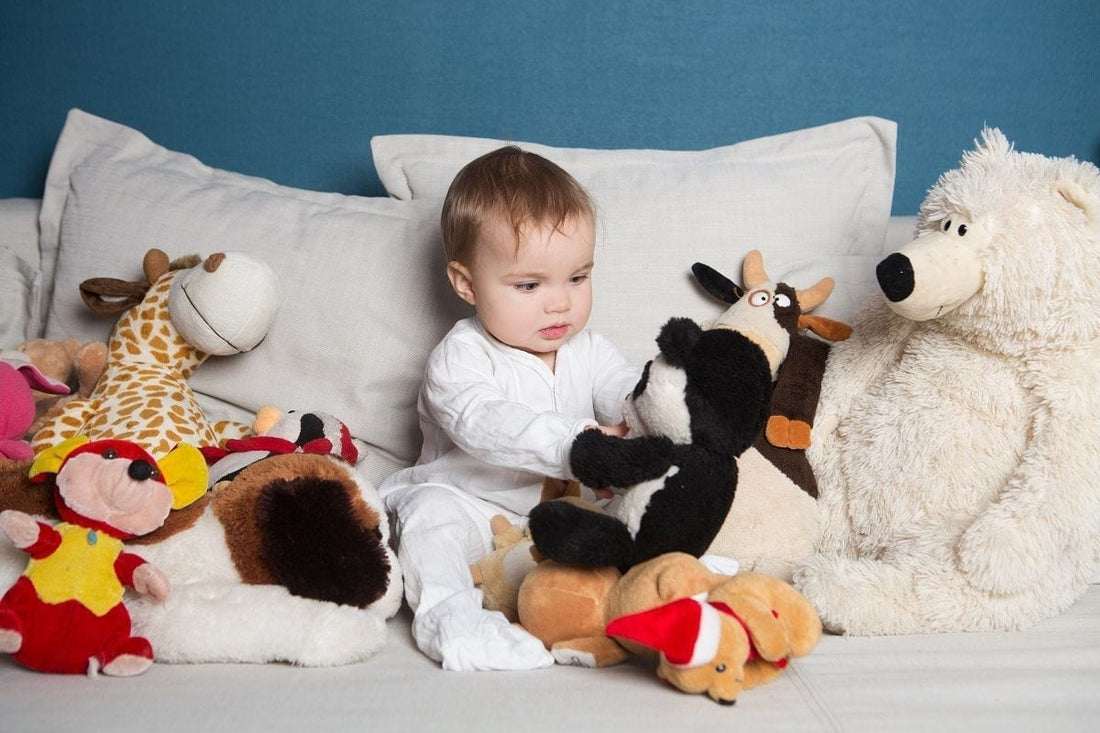
Soft Toys: More than a Toy, a Friend for Life
Frederic ChassanyEingabe: Teilen Input: Like Output: Mögen Input: Comment Output: Kommentar Input: Share this post with your friends Output: Teilen Sie diesen Beitrag mit Ihren Freunden Input: Like this photo if you agree Output: Mögen Sie dieses Foto, wenn Sie zustimmen Input: Leave a comment below Output: Hinterlassen Sie einen Kommentar unten
In the enchanted world of childhood, soft toys occupy a unique and irreplaceable place. These sweet stuffed fabric companions aren't just toys; they often become loyal friends and sources of comfort. Why are stuffed animals so special and how are these emotional bonds formed over the years? In this article, we will explore the different facets of soft toys and their lasting impact on our lives.
A Loyal Friend from the Start
From birth, stuffed animals are often given as gifts. Their softness and charming appearance immediately captivate little ones, providing them with a feeling of security and comfort. These plush companions quickly become central elements in children's daily lives, accompanying them at every stage of their growth. Children form strong bonds with their stuffed animals, giving them names, talking to them and integrating them into their games.
Comfort in Difficult Times
When children go through difficult times, whether it's a fear of the dark, separation from parents or simple sorrows, soft toys are there to console them. Their reassuring presence and soothing hugs relieve tormented hearts and bring an incomparable feeling of security. Studies show that children who sleep with stuffed animals feel safer and have fewer nightmares. Soft toys thus become silent protectors watching over the emotional well-being of children.
A Witness to Great Adventures
Stuffed animals don't just sit on a shelf; they are often the accomplices of the most adventurous games. Whether in imaginary stories, fantastical journeys or explorations in the garden, soft toys become faithful play partners, stimulating children's creativity and imagination. Through these games, children learn to solve problems, collaborate and develop essential social skills.
Lasting Emotional Connections
Even as they grow up, stuffed animals continue to play a crucial role in people's emotional lives. Although their interests evolve, the memories attached to these plush companions remain intact. They become precious relics of childhood, recalling moments of happiness and security. Many adults save their childhood stuffed animals and pass them on to their own children, continuing the special bond they represent.
A Transgenerational Legacy
The love for stuffed animals often transcends generations. Many adults keep their childhood stuffed animals as treasured keepsakes, and some pass them on to their children, continuing a special bond. These objects charged with emotion cross the years, preserving memories and family traditions. Each new generation discovers the history attached to these beloved stuffed animals, strengthening family bonds through time.
Soft Toys and Child Development
Soft toys play a key role in children's social and emotional development. They teach compassion, empathy and sharing, allowing young people to practice essential social skills through imaginative play. By interacting with their stuffed animals, children learn to express their emotions and manage difficult situations. Soft toys can also help develop fine motor skills and communication skills.
The Impact of Soft Toys on Adults
The impact of soft toys is not limited to childhood. For many adults, these childhood companions remain symbols of nostalgia and comfort. They recall a time when concerns were simple and imagination had no limits. Some adults even collect stuffed animals, perpetuating their affection for these fabric friends. Stuffed animals also serve as a tangible reminder of the values of compassion and empathy, essential qualities in adult life.
Soft Toys in Popular Culture
Soft toys have also found their way into popular culture. Many plush characters have become icons in their own right, such as Winnie the Pooh, Paddington or the famous stuffed Pokémon. These characters transcend generations and continue to influence young minds with their touching stories and captivating adventures. Soft toys also inspire many films, books and television shows, reinforcing their presence in our lives.
How to Choose the Perfect Plush Toy
Choosingthe ideal soft toy for a child may seem simple, but there are several factors to consider. Safety is paramount: make sure the plush toy is made with non-toxic materials and does not have small parts that can be ingested. Size and texture are also important: a stuffed animal that is too large can be intimidating to a young child, while a soft, fluffy stuffed animal will be more comforting. Finally, opt for stuffed animals that are easy to wash, as they will often be cuddled and dragged around everywhere.
Maintenance and Durability of Soft Toys
For soft toys to remain faithful companions over the years, proper care is essential. Most stuffed animals can be machine washed, but it's always best to check the manufacturer's specific care instructions. In general, using a wash bag and a gentle cycle will help preserve the shape and texture of the plush toy. For more delicate plush toys, hand cleaning may be necessary. Make sure to dry the stuffed animals well to prevent mold from forming.
In conclusion, stuffed animals are not just toys, but friends for life. Their importance goes far beyond their soft appearance and charming design. They are the guardians of memories, the accomplices of adventures and the comfort in difficult times. Their emotional value is inestimable and their impact on our lives indelible. Whatever the age, soft toys will continue to remind us of the importance of friendship and tenderness across generations.